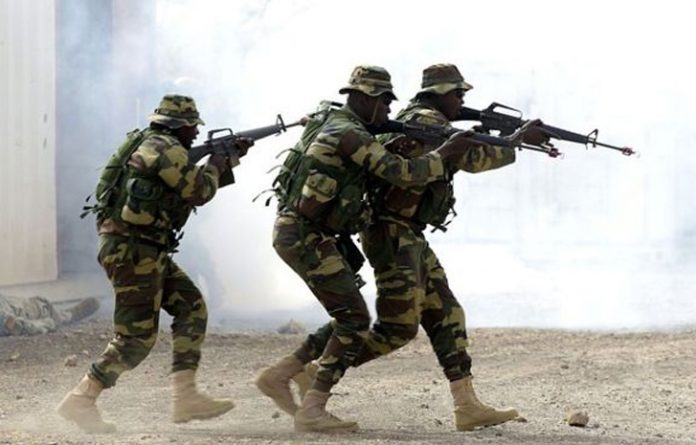President of the Senate, Ahmad Lawan’s statement, the other day, attributing the inability of the Nigerian military and other security agencies to contain the escalating nation’s insecurity to international politics is defeatist and laughable. The President of the Senate is not telling the whole truth and this is unfortunate.
The question is how the insurgents have been able to acquire the sophisticated weapons they have used to sustain the fight for over 10 years, while Nigeria, a sovereign nation has been unable to do so? This is the paradox of the battle against insecurity, which shows that something is wrong somewhere.
According to Lawan, who spoke during an interview with newsmen ahead of the first anniversary of the Ninth Senate, international politics was slowing down efforts aimed at acquiring sophisticated machinery needed by security agencies to do their job.
Lamenting further, Lawan said: “I know that in our efforts to try to buy spare parts for jets, they may write to a certain foreign government and it will take six to nine months while another country will write to the same government and maybe get it in one or two months.” He did not say why Nigeria is treated with levity by certain foreign nations.
Reiterating what has been repeated on several occasions, he said we needed more resources for security. By resources, I don’t mean just money; we need more personnel for the armed forces. “We need more personnel for the police, Nigerian immigration Service, and almost all the agencies and paramilitary as well. We also need resources in terms of equipment, machinery, and then training. What we experience today is we don’t have sufficient personnel, the resources available to security office are inadequate,” he concluded.
Lawan’s outburst, in a way, is tantamount to underrating Nigeria as being handicapped and unable to successfully confront the ravaging insecurity across the country. That cannot be the case. It is unfortunate that from the outset, government underrated Boko Haram. By treating the insurgents with kid gloves, rather than declaring a full-scale war, they had the leeway to transform from being a bunch of ragtag rebels to a formidable and well-organised force.
Rather than deal with the problem decisively and nip it in the bud, the government continued to play politics with a vicious emerging problem until it got out of hand. Today, Boko Haram has become the mother of insurgency in the country.
The 10-year-old bloody insurgency has claimed thousands of lives and devastated the area. Borno State is the epicenter, while Yobe and Adamawa states have also been ravaged. Over two million people comprising mostly women, children and the elderly, have been rendered homeless and are now quartered in Internally Displaced Persons (IDP) camps across the states.
Around 2015 or thereabouts, government unequivocally declared that Boko Haram has been technically defeated. But all that has proved to be a mirage as the insurgents became more ferocious in the attacks on hapless villagers in the war zone.
All the promises of the government to free the Northeast from the stranglehold of Boko Haram have been fruitless. Government, as a matter of fact, has failed Nigerians in this battle despite the huge budgetary outlay, which has not led to equipping the military adequately. In 2014, the immediate past Governor of Borno State, Kashim Shettima, declared, unequivocally, that the terrorists were better armed than government forces fighting it. He was harshly rebuked from different quarters and even branded as sabotaging the war for saying so.
“Given the present state of affairs, it is absolutely impossible for us to defeat Boko Haram,” Shettima was quoted by Reuters news agency as saying.
Recently, Shettima’s successor, the Governor of Borno State, Babagana Umara Zulum, raised the same alarm over the lingering war with Boko Haram and the fact that it might not end soon. The Governor raised the alarm in Maiduguri while briefing the House of Representatives Speaker, Femi Gbajabiamila and other members of the National Assembly (NASS) who were on a security assessment mission in the state.
According to him, “This Boko Haram war may not end soon because the terrorists now deploy drones in their operations.” This, to him, indicates that the terrorists seem to possess better technological weapons of warfare than the military.
The Borno State Governor’s candid view that without adopting proper and up-to-date technological warfare edge over Boko Haram, this war would never end, should not be taken lightly by the Commander-in-Chief of the armed forces.
Government should use whatever possible means within its power to end the crisis. Government may in truth be doing its best but internal sabotage may be at play to frustrate the effort. That is why continued retention of the service and security chiefs whose tenures have expired amid consistent failure in a fighting insurgency is not in pubic interest anymore.
It is trite to say that wars hardly end on the battlefield but on the negotiating table. Government should continue to seek dialogue with the insurgents. Finally, the military should not relent but should continue to show more commitment and patriotism in the defence of the nation that will always salute their gallantry.



